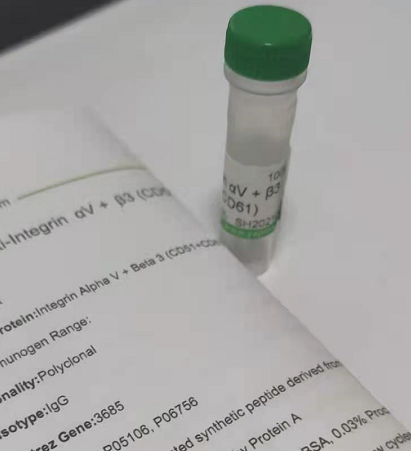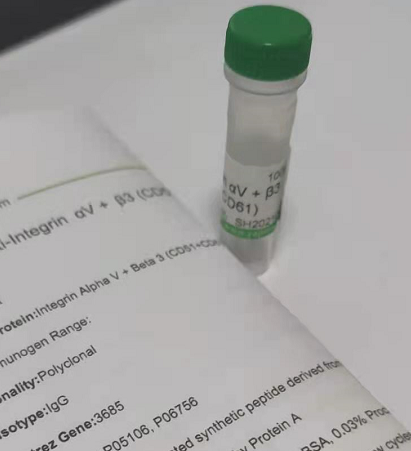| 產(chǎn)品編號(hào) | Ys-2962R |
| 英文名稱 | Syncytin 1 |
| 中文名稱 | 合胞素1抗體 |
| 別 名 | HERV-W_7q21.2 provirus ancestral Env polyprotein; Endogenous retrovirus group W member 1; env; Env-W; Envelope polyprotein gPr73; Enverin; ENW1_HUMAN; ERVW; ERVW-1; Gp24; Gp50; HERV-7q Envelope protein; HERV-W envelope protein; HERVW; SU; Syncytin 1; Syncytin; Syncytin-1; TM; Transmembrane protein; Surface protein. |
| 抗體來(lái)源 | Rabbit |
| 克隆類型 | Polyclonal |
| 交叉反應(yīng) | Human, Mouse, |
| 產(chǎn)品應(yīng)用 | WB=1:500-2000 ELISA=1:5000-10000 not yet tested in other applications. optimal dilutions/concentrations should be determined by the end user. |
| 理論分子量 | 33/58kDa |
| 細(xì)胞定位 | 細(xì)胞膜 細(xì)胞外基質(zhì) |
| 性 狀 | Liquid |
| 濃 度 | 1mg/ml |
| 免 疫 原 | KLH conjugated synthetic peptide derived from human Syncytin 1: 451-538/538 |
| 亞 型 | IgG |
| 純化方法 | affinity purified by Protein A |
| 緩 沖 液 | 0.01M TBS(pH7.4) with 1% BSA, 0.03% Proclin300 and 50% Glycerol. |
| 保存條件 | Shipped at 4℃. Store at -20 °C for one year. Avoid repeated freeze/thaw cycles. |
| 注意事項(xiàng) | This product as supplied is intended for research use only, not for use in human, therapeutic or diagnostic applications. |
| PubMed | PubMed |
| 產(chǎn)品介紹 | Retroviral envelope proteins mediate receptor recognition and membrane fusion during early infection. Endogenous envelope proteins may have kept, lost or modified their original function during evolution. This endogenous envelope protein has retained its original fusogenic properties and participates in trophoblast fusion during placenta morphogenesis. SU mediates receptor recognition. This interaction triggers the refolding of the transmembrane protein (TM) and is thought to activate its fusogenic potential by unmasking its fusion peptide (By similarity). Seems to recognize the type D mammalian retrovirus receptors SLC1A4 and SLC1A5, as it induces fusion of cells expressing these receptors in vitro. The transmembrane protein (TM) acts as a class I viral fusion protein. Under the current model, the protein has at least 3 conformational states: pre-fusion native state, pre-hairpin intermediate state, and post-fusion hairpin state. During viral and target cell membrane fusion, the coiled coil regions (heptad repeats) assume a trimer-of-hairpins structure, positioning the fusion peptide in close proximity to the C-terminal region of the ectodomain. The formation of this structure appears to drive apposition and subsequent fusion of membranes. Function: Retroviral envelope proteins mediate receptor recognition and membrane fusion during early infection. Endogenous envelope proteins may have kept, lost or modified their original function during evolution. This endogenous envelope protein has retained its original fusogenic properties and participates in trophoblast fusion during placenta morphogenesis. SU mediates receptor recognition. This interaction triggers the refolding of the transmembrane protein (TM) and is thought to activate its fusogenic potential by unmasking its fusion peptide (By similarity). Seems to recognize the type D mammalian retrovirus receptors SLC1A4 and SLC1A5, as it induces fusion of cells expressing these receptors in vitro. The transmembrane protein (TM) acts as a class I viral fusion protein. Under the current model, the protein has at least 3 conformational states: pre-fusion native state, pre-hairpin intermediate state, and post-fusion hairpin state. During viral and target cell membrane fusion, the coiled coil regions (heptad repeats) assume a trimer-of-hairpins structure, positioning the fusion peptide in close proximity to the C-terminal region of the ectodomain. The formation of this structure appears to drive apposition and subsequent fusion of membranes (By similarity). Subunit: The mature envelope protein (Env) consists of a trimer of SU-TM heterodimers attached probably by a labile interchain disulfide bond. Interacts with the C-type lectin CD209/DC-SIGN. Subcellular Location: Transmembrane protein: Cell membrane; Single-pass type I membrane protein (By similarity). Surface protein: Cell membrane; Peripheral membrane protein (By similarity). Note=The surface protein is not anchored to the membrane, but localizes to the extracellular surface through its binding to TM (By similarity). HERV-W_7q21.2 provirus ancestral Env polyprotein: Virion (By similarity). Tissue Specificity: Expressed at higher level in placental syncytiotrophoblast. Expressed at intermediate level in testis. Seems also to be found at low level in adrenal tissue, bone marrow, breast, colon, kidney, ovary, prostate, skin, spleen, thymus, thyroid, brain and trachea. Both mRNA and protein levels are significantly increased in the brain of individuals with multiple sclerosis, particularly in astrocytes and microglia. Post-translational modifications: Specific enzymatic cleavages in vivo yield mature proteins. Envelope glycoproteins are synthesized as a inactive precursor that is heavily N-glycosylated and processed likely by furin in the Golgi to yield the mature SU and TM proteins. The cleavage site between SU and TM requires the minimal sequence [KR]-X-[KR]-R. The intracytoplasmic tail cleavage by the viral protease that is required for the fusiogenic activity of some retroviruses envelope proteins seems to have been lost during evolution. The CXXC motif is highly conserved across a broad range of retroviral envelope proteins. It is thought to participate in the formation of a labile disulfide bond possibly with the CX6CC motif present in the transmembrane protein. Isomerization of the intersubunit disulfide bond to an SU intrachain disulfide bond is thought to occur upon receptor recognition in order to allow membrane fusion (By similarity). Similarity: Belongs to the gamma type-C retroviral envelope protein family. HERV class-I W env subfamily. SWISS: Q9UQF0 Gene ID: 30816 |
我要詢價(jià)
*聯(lián)系方式:
(可以是QQ、MSN、電子郵箱、電話等,您的聯(lián)系方式不會(huì)被公開)
*內(nèi)容:









